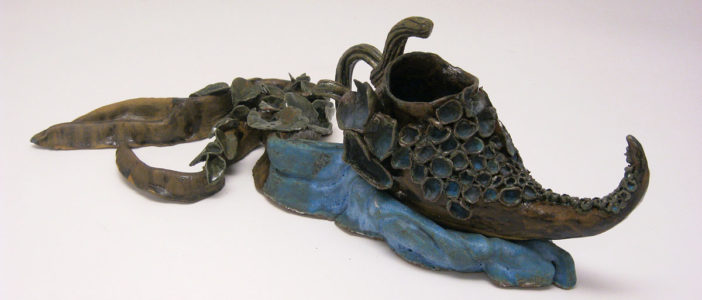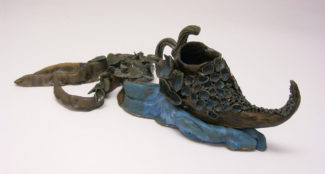
Bridging Cultural Difference in Albert Camus’s “The Guest”
By Marin Harrington '21
ENGL 362: World Literature ll
Marin reads this story, not as the narrator’s existential crisis (as is so common), but as an illustration of how a cultural gap – in this case, between the French and Arab people – can be effectively overcome through a kind of wordless empathy. By looking at the story in this unusual way, Marin breathes new life into it, and reveals how contemporary the story seems.
– Michael Harris
Differences between cultures—whether related to race, nationality, gender, sexual orientation, socioeconomic class, or political affiliation—are frequently the root of conflict, and these types of conflicts are often well-documented. Less discussed are the instances when people unify despite their cultural differences, or, even more profoundly, expand their own worldview by understanding someone else’s cultural perspective. Albert Camus’s short story “The Guest” is grounded in cultural differences, from the setting in French-colonized Algeria to the relationship between the two main characters: Daru, a school teacher, and the Arab, a prisoner. Despite its 1957 publication and setting in a colony which no longer exists, the story maintains its relevance by exploring the various ways humans can contemplate, empathize, and connect amidst cultural differences, a process that remains essential in the face of increased globalization.
Daru’s relationship with his profession as a teacher is a way of reaching across differences, it and highlights the emotional reflection in which he frequently partakes. How people feel is often different from how they want to feel, as evidenced by the loneliness Daru alludes to when his students are not in school because of the region’s extreme weather. Describing the scarce light emanating from his classroom window, Daru thinks this weather is still “better than those three days when the thick snow was falling amidst unbroken darkness… Then Daru had spent long hours in his room, leaving it only to go to the shed and feed the chickens or get some coal” (2574). His feelings of isolation are something he wants to escape, and while they exist in part due to the weather, they are also fueled by the absence of his students. He does not judge his students for their nationality or low socioeconomic class, either. In fact, the class difference between Daru and his students makes him more self-reflective, and he displays empathy towards them. After explaining that the school provides daily food rations to the children yet the children do not have access to these rations when weather prevents them from going to school, Daru refers to the children as “victims” and says he feels like “a lord with his whitewashed walls, his narrow couch, his unpainted shelves, his well, and his weekly provisions of water and food” (2575). He struggles to reconcile the privilege he has over his students and never displays hostility towards them. Daru recognizes the need to try to understand the situations of those who are different from himself, and this informs much of his empathy later in the story.
Daru must also navigate the difference between how he feels about the physical land upon which he lives and how he feels about the political conflict that overruns the land. He describes the land as “cruel to live in, even without men,” but also feels attached to the region because “Daru had been born here. Everywhere else, he felt exiled” (2575). No matter the conditions of the land, Daru is unable to leave it, as moving anywhere else would feel like a displacement rather than a choice. There are also political expectations that accompany living on the land, which create conflict within Daru. He challenges the idea that he must take the Arab to the police simply because Balducci, a Frenchman, orders him to. Daru claims that such a task is not his job, but Balducci tells him that wartime makes people servants to the place they live, citing that, “In wartime people do all kinds of jobs” (2576). The physical space gets swallowed by the political atmosphere, and Daru must figure out how to relate to the physical space with this outside tension. Balducci also holds complacent attitudes towards the poor that conflict with Daru’s own guilt about being privileged over his students. When Daru resists Balducci’s orders to deliver the Arab to the police, Balducci attempts to persuade him by saying, “After that, all will be over. You’ll come back to your pupils and your
comfortable life” (2576). The harshness of the land that fuels Daru’s pupils’ poverty gets overshadowed by political motivations. Daru’s relationship to place is further complicated by the need to assign everyone on the land to a specific political agenda. When debating whether or not he will follow Balducci’s orders to take the Arab to prison, Daru asks, “Is [the Arab] against us?” and Balducci responds, “I don’t think so. But you can never be sure” (2576). The land is used as a backdrop for political and social divisions, which affects Daru’s own relationship to it and forces him to examine the cultural tensions around him.
While Daru’s politeness towards the Arab manifests itself in small gestures, these still indicate a desire to at the very most connect with—and at the very least not alienate—the Arab.
The most significant way Daru communicates across differences in “The Guest” is through his interactions with the Arab. Upon learning that the Arab supposedly slit his cousin’s throat, Daru feels “a sudden wrath against the man, against all men with their rotten spite, their tireless hates, their blood lust” (2577). Yet, Daru treats the Arab humanely despite this frustration. While Daru’s politeness towards the Arab manifests itself in small gestures, these still indicate a desire to at the very most connect with—and at the very least not alienate—the Arab. For example, Daru notes that the Arab “might perhaps be untied” before giving him tea and does not re-tie the rope around the Arab’s wrists even though Balducci recommends doing so (2577). When Balducci tells Daru to keep a gun near his bed while the Arab is with him, Daru simply responds, “Why? I have nothing to fear” (2577). Daru also equalizes the relationship between the Arab and himself by speaking to him in Arabic, not French (2578). The Arab is also allowed to sleep in a bed in the same room as Daru despite his criminal status, another attempt to coexist despite cultural differences. It is never entirely clear whether the Arab is innocent or guilty of the crime of which Balducci accuses him; the fact that Daru makes the decision to treat him well despite this perceived ‘moral’ difference between them conveys an instinct to place humanity and simple acts of goodness above mindlessly following orders simply because they are a cultural expectation.
All these various types of interactions across differences lead Daru to make an ultimate choice about his feelings towards the Arab. Despite the contrasts between them, Daru finds himself emotionally closer to—not more distant from—the Arab as the two of them spend more time together. This closeness presents its own challenges, however, as Daru feels that the Arab was “imposing on him a sort of brotherhood he knew well but refused to accept in the present circumstances” (2580). Due to the power Daru holds over the Arab as his ‘transport’ to the police and the political climate of the region, the differences between the two are evident and make forging friendship a complicated endeavor. The human connection, however, is undeniable, as the two sharing a space leads to the development of “a strange alliance,” according to Daru (2580). What results, then, is the potential to “fraternize every evening, over and above their differences, in the ancient community of dream and fatigue” (2580). Their differences might not be ignorable, but the humanity the two men find within each other is more prominent. Prior to showing the Arab the road towards the police and the road towards the nomadic village where the Arab might seek refuge and allowing the Arab to choose the best-suited path, Daru thinks, “[The Arab’s] stupid crime revolted him, but to hand him over was contrary to honor” (2580). To Daru, demeaning the Arab’s dignity is a worse act than potentially committing a crime. While the Arab decides to take the road towards the prison (but not before trying to warn Daru of something), and the story ends with Daru finding a message that says, “You handed over our brother. You will pay for this,” signaling the danger the Arab tried to help Daru avoid, the two exemplify an attempt—if not more—at kindness across cultures (2852).
“The Guest” by Albert Camus is an exercise in cultural difference. The story understands the challenges of intercultural interactions and the life-altering risks that sometimes accompany them, but the work also encourages thoughtfulness and compassion. While the outcome is bleak for Daru and the Arab, the brief moment in time in which they gain each other’s trust is admirable and, unfortunately, rare. Perhaps one day the forces that break the two apart will no longer exist, but only if people first put in the effort to see beyond their differences.
Works Cited
Camus, Albert. “The Guest.” The Norton Anthology of World Literature: The Twentieth Century, 2nd ed., edited by Sarah Lawall and Maynard Mack, W. W. Norton & Company, 2002, pp. 2574 – 2582.
